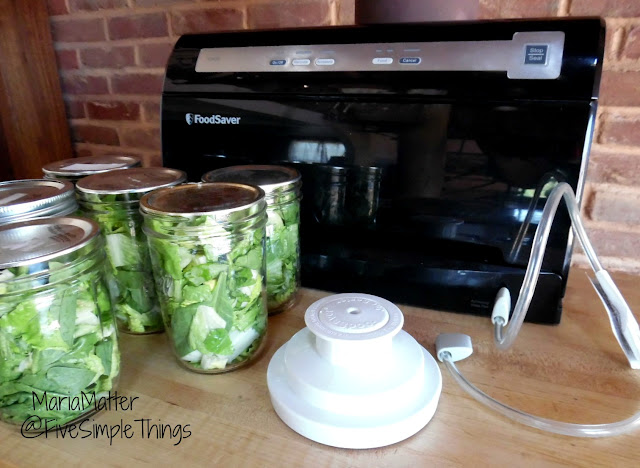I'm a salad-lover!
I could eat a salad every day,
and I usually do.
Yet I'm always throwing away
lettuce that has turned brown or wilted.
note: I don't actually throw it in
the trash bin, it goes to the chickens/compost.
Well, no more!!
(cue dramatic "ta-da"music here)
I now preserve my lettuce in canning jars
with my handy dandy FoodSaver vacuum sealer.
We purchased jar sealers for both regular
and wide-mouth. These use the accessory
hose that comes with most FoodSaver models.
Here's how we do it!
We use a mix of lettuce, whatever
we're growing along with store-
bought.
1. Chop it into bite-size pieces.
2. Wash and DRY it really well
in your salad spinner or with
paper towels.
3. Pack your mix of lettuce into
mason jars. Push in as much
as you can!
4. Place a lid* on the jar.
5. Place the jar sealer over the lid.
6. Attach the hose to both the jar
sealer and your machine, hit
the vacuum button.
7. When it is finished, DETACH
the HOSE from the jar sealer
first. You should hear a ping.
8. Then remove the jar sealer from
your mason jar. Test the lid to make
sure its sealed!
9. Keep your jars in the refrigerator
for up to seven days.
That's it.
* you can use new lids (and still use them for canning later) or
you can reuse old lids as long as they aren't too banged up.
Also, this works for quart or pint jars.
I use a pint because that is a perfect serving size for me.
We have been doing this for well over a year now.
You can experiment with different lettuce. More delicate leaves/spinach, I know just starts to turn by the seventh day. However, more sturdy leaves such as romaine will last longer.
This is a huge time saver during the week. For lunch, I simply
grab a jar, empty it onto my plate throw on a few toppings and
I'm good to go!
I have a friend that takes a jar with her to work each day, she puts
her toppings in another container; grabs both on her way out the
door.
I'm all about prepping for one day,
so I can eat for a week.
Do you have any prepping shortcuts
to share??
























